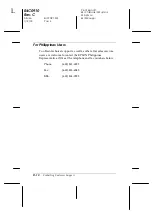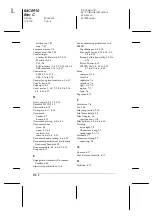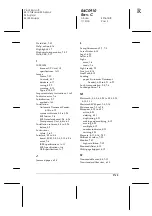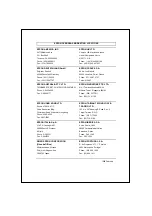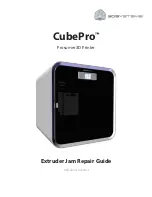
4
Glossary
L
R4C0910
Rev. C
A5 size
GLOSS.FM
1/12/00
Pass 3
Proof Sign-off:
SEI Y.Takasaki M.Fujimori
M.Fujimori
SEI M.Kauppi
primary colors
Basic colors. See
additive primary colors
and
subtractive primary colors.
resolution
Indication of how finely an image is resolved into pixels. Measured in dots per
inch (dpi), pixels per inch (ppi), or samples per inch (spi).
scan
An operation performed by the sensor and the carriage. The image is divided
into pixels by scanning.
scanning area
The physical size of the image that can be scanned by the scanner.
SCSI
Small Computer System Interface. This is one method used to connect your
computer to peripherals such as scanners, hard disk drives, CD-ROM drives, and
so on.
SCSI ID
The numbers that all devices in a SCSI connection (see
daisy chain
) use to identify
each other. If the same ID number is used by two devices in the same daisy chain,
the devices cannot operate properly.
sRGB
A standard color space used as the default color space within the Windows 98
color management system (ICM 2.0).
subtractive primary colors
The colors of cyan, magenta, and yellow (CMY) - which produce black when
mixed in certain amounts. In printing, black is often added to give more definition
as mixing of actual inks cannot produce pure black.
terminator
A device that stops electronic signals, and prevents them from proceeding or
returning to other devices. This is necessary to stop a signal from continuously
bouncing between devices.
threshold
A reference point that is used to determine whether data will be processed as
“on” or “off”. In the case of color image data, “on” means that a certain color will
appear in a pixel or dot, and “off” means that color will not appear there.
tone correction
A method of adjusting the tone curve so that the reproduction results on different
types of output devices have gradations similar to the original image.
tone curve
The graph that shows the contrast ratio between the input (original image) and
output (image data) in image processing.











